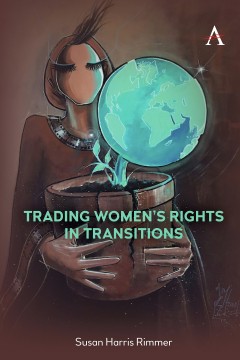Trading Women's Rights in Transitions
By Susan Harris Rimmer
Other Formats Available:
- About This Book
- Reviews
- Author Information
- Series
- Table of Contents
- Links
- Podcasts
About This Book
Transition in international relations means moving from war to peace, dealing with an economic crisis or changing from one system of government to another. One of the key means by which this occurs is the diplomatic process of bargaining, compromising, settlement or trading. There is, however, a danger that in order to secure political objectives or preferences, negotiators or decision-makers may ‘trade away’ the interests of vulnerable or emerging social forces, sometimes knowingly, more often without due appreciation of the interests at threat.
Trading Women's Rights in Transitions is about how women’s rights are traded away by negotiators directly in exchange for immediate political or other settlements, and indirectly in terms of being left off the international agenda with long-term consequences.
The book provides a heterodox and critical view of the gender politics of transitions, focused on conflict-affected states. Susan Rimmer examines the link between negotiation processes around the globe and outcomes for social groups who struggle to gain access to power, focussing on the rights of women and girls. The struggle between actors in reformist groups can also trade away women’s rights before the agenda with international actors is agreed. The aim of this book is to assess ideas and discourse about the ‘tradeability’ of a group’s rights in states experiencing a seismic transition, such as in Afghanistan or Myanmar. What does diplomacy look like ‘from below’ in these situations?
Reviews
Author Information
Susan Harris Rimmer is the Director of the Policy Innovation Hub at Griffith University, Australia, and researches gender equality under international law, transitional justice and feminist approaches to diplomacy.
Series
Table of Contents
Foreword by Judge Hilary Charlesworth ICJ; Introduction: Women’s Rights as an Invisible Bargaining Chip; 1. Explicit Trades: The State of Play; 2. Implicit Trades: Ordinary Crimes and Ordinary Justice in Extraordinary Moments; 3. Implicit Trades: Economic Agendas as the Missing Link; 4. Designing Frontline Feminist Diplomacy in Transitional States; Conclusions: Women Trading Up in Transitions; Appendix A. Menu of Options for Diplomatic Posts; Appendix B. List of Interviewees; Bibliography – Link to Further Online Resources.
Links
Stay Updated
Information
Latest Tweets



